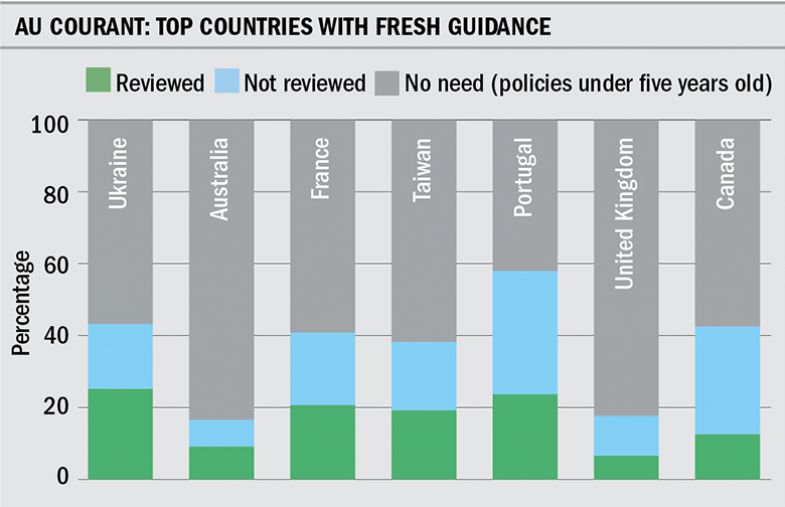Browse the full Impact Rankings 2021 results
Most universities have policies on a wide range of matters, from anti-discrimination to the disposal of hazardous waste. But once these codes and procedures are written and published, are they archived and forgotten or are they regularly reviewed and, if necessary, updated?
Analysis of the data behind the Times Higher Education Impact Rankings reveals that just over half (59 per cent) of university policies relating to the United Nations’ Sustainable Development Goals (SDGs) have been created or reviewed within the past five years. Of those policies that were at least five years old in 2019, only 29 per cent were reviewed in 2020.
However, the results differ widely by geography, with universities in Ukraine, Australia and France most likely to regularly review their policies, and those in Brazil, Iran and Japan the least likely (when only countries with at least 10 institutions in the 2020 and 2021 rankings were included). The data show that 58 per cent of policies at Ukrainian universities were reviewed in 2020 (where applicable), compared with only 15 per cent at Brazilian institutions.

Meanwhile, Australia and the UK have the highest share of policies that were created or reviewed less than five years ago and are therefore still likely to be relevant (83 per cent and 82 per cent respectively). The lowest share is in Pakistan, where just 40 per cent of policies are recent (and of those that are not, just 24 per cent were reviewed).
The two Impact Rankings indicators where the evidence provided was most likely to be up to date both concern policies on anti-discrimination; these guidelines were created or reviewed less than five years ago at 72 per cent of institutions, while 37 per cent of older policies in this area were reviewed in 2020.
Policies to ensure all renovations or newbuilds follow energy-efficiency standards are the most likely to be reviewed in 2020, with 41 per cent of institutions with old policies in this area doing so. These findings might be related to the fact that equity, diversity and inclusion and climate action have become increasingly important priorities for institutions in recent years.
Meanwhile, at the other end of the scale, just 34 per cent of institutions have a recent policy to ensure that seafood on campus is sustainably harvested, and just 17 per cent of older policies in this area were reviewed last year.
Overall, policy areas that have recent guidelines at the majority of institutions tend to also be regularly updated at institutions with older documents.
The analysis was based on 10,696 policies across 765 universities in 86 countries or territories. It drew on data on 31 indicators in the Impact Rankings, all of which asked institutions whether they had a policy in a certain area (and, if so, to provide evidence), whether it was public and whether it was created or reviewed between 2015 and 2020.
POSTSCRIPT:
Print headline: Go set a watchman
Register to continue
Why register?
- Registration is free and only takes a moment
- Once registered, you can read 3 articles a month
- Sign up for our newsletter
Subscribe
Or subscribe for unlimited access to:
- Unlimited access to news, views, insights & reviews
- Digital editions
- Digital access to THE’s university and college rankings analysis
Already registered or a current subscriber? Login









